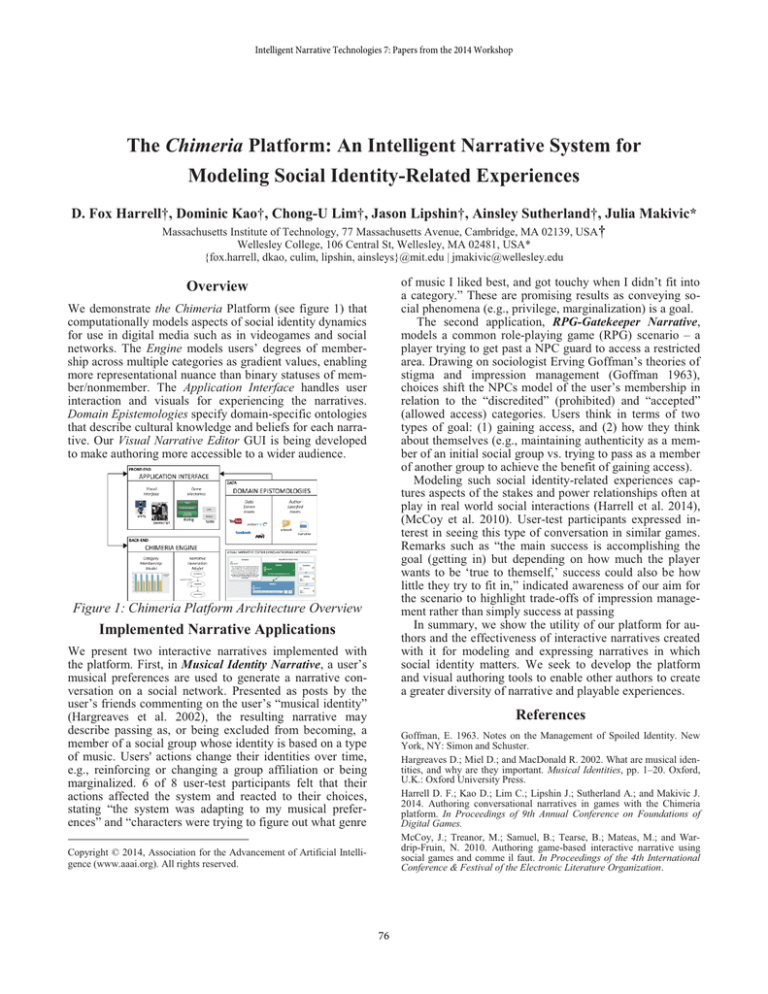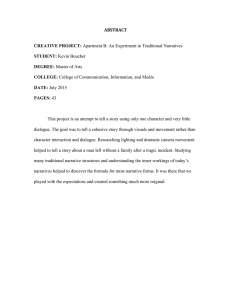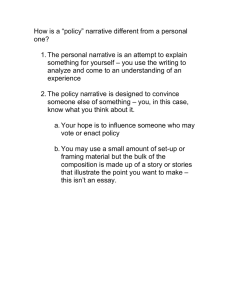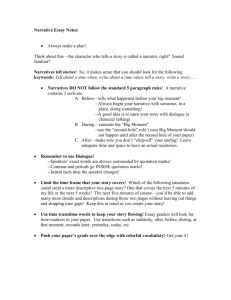
Intelligent Narrative Technologies 7: Papers from the 2014 Workshop
The Chimeria Platform: An Intelligent Narrative System for
Modeling Social Identity-Related Experiences
D. Fox Harrell†, Dominic Kao†, Chong-U Lim†, Jason Lipshin†, Ainsley Sutherland†, Julia Makivic*
Massachusetts Institute of Technology, 77 Massachusetts Avenue, Cambridge, MA 02139, USA†
Wellesley College, 106 Central St, Wellesley, MA 02481, USA*
{fox.harrell, dkao, culim, lipshin, ainsleys}@mit.edu | jmakivic@wellesley.edu
of music I liked best, and got touchy when I didn’t fit into
a category.” These are promising results as conveying social phenomena (e.g., privilege, marginalization) is a goal.
The second application, RPG-Gatekeeper Narrative,
models a common role-playing game (RPG) scenario – a
player trying to get past a NPC guard to access a restricted
area. Drawing on sociologist Erving Goffman’s theories of
stigma and impression management (Goffman 1963),
choices shift the NPCs model of the user’s membership in
relation to the “discredited” (prohibited) and “accepted”
(allowed access) categories. Users think in terms of two
types of goal: (1) gaining access, and (2) how they think
about themselves (e.g., maintaining authenticity as a member of an initial social group vs. trying to pass as a member
of another group to achieve the benefit of gaining access).
Modeling such social identity-related experiences captures aspects of the stakes and power relationships often at
play in real world social interactions (Harrell et al. 2014),
(McCoy et al. 2010). User-test participants expressed interest in seeing this type of conversation in similar games.
Remarks such as “the main success is accomplishing the
goal (getting in) but depending on how much the player
wants to be ‘true to themself,’ success could also be how
little they try to fit in,” indicated awareness of our aim for
the scenario to highlight trade-offs of impression management rather than simply success at passing
In summary, we show the utility of our platform for authors and the effectiveness of interactive narratives created
with it for modeling and expressing narratives in which
social identity matters. We seek to develop the platform
and visual authoring tools to enable other authors to create
a greater diversity of narrative and playable experiences.
Overview
We demonstrate the Chimeria Platform (see figure 1) that
computationally models aspects of social identity dynamics
for use in digital media such as in videogames and social
networks. The Engine models users’ degrees of membership across multiple categories as gradient values, enabling
more representational nuance than binary statuses of member/nonmember. The Application Interface handles user
interaction and visuals for experiencing the narratives.
Domain Epistemologies specify domain-specific ontologies
that describe cultural knowledge and beliefs for each narrative. Our Visual Narrative Editor GUI is being developed
to make authoring more accessible to a wider audience.
Figure 1: Chimeria Platform Architecture Overview
Implemented Narrative Applications
We present two interactive narratives implemented with
the platform. First, in Musical Identity Narrative, a user’s
musical preferences are used to generate a narrative conversation on a social network. Presented as posts by the
user’s friends commenting on the user’s “musical identity”
(Hargreaves et al. 2002), the resulting narrative may
describe passing as, or being excluded from becoming, a
member of a social group whose identity is based on a type
of music. Users' actions change their identities over time,
e.g., reinforcing or changing a group affiliation or being
marginalized. 6 of 8 user-test participants felt that their
actions affected the system and reacted to their choices,
stating “the system was adapting to my musical preferences” and “characters were trying to figure out what genre
References
Goffman, E. 1963. Notes on the Management of Spoiled Identity. New
York, NY: Simon and Schuster.
Hargreaves D.; Miel D.; and MacDonald R. 2002. What are musical identities, and why are they important. Musical Identities, pp. 1–20. Oxford,
U.K.: Oxford University Press.
Harrell D. F.; Kao D.; Lim C.; Lipshin J.; Sutherland A.; and Makivic J.
2014. Authoring conversational narratives in games with the Chimeria
platform. In Proceedings of 9th Annual Conference on Foundations of
Digital Games.
McCoy, J.; Treanor, M.; Samuel, B.; Tearse, B.; Mateas, M.; and Wardrip-Fruin, N. 2010. Authoring game-based interactive narrative using
social games and comme il faut. In Proceedings of the 4th International
Conference & Festival of the Electronic Literature Organization.
Copyright © 2014, Association for the Advancement of Artificial Intelligence (www.aaai.org). All rights reserved.
76




